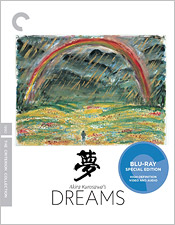Dreams, Akira Kurosawa’s (Blu-ray Review)

Director
Akira KurosawaRelease Date(s)
1990 (November 15, 2016)Studio(s)
Kurosawa U.S.A./Amblin/Warner Bros. (The Criterion Collection – Spine #842)- Film/Program Grade: B+
- Video Grade: A
- Audio Grade: A
- Extras Grade: A
Review
Almost any way you approach it, Dreams is a singularly unusual entry in Kurosawa’s overall body of work. Composed of a series of eight visually and thematically lyrical vignettes, the film lacks a narrative in the traditional sense. Instead, each vignette is presented as an individual “dream,” all of which are based upon Kurosawa’s own dreams. As such, this film serves as a unique examination of the specific human issues of concern to the filmmaker, including the purpose of the individual, the nature of life and death, our relationship with the natural world, the roots and unthinkable costs of warfare, and the dangers of out-of-control technology (specifically, nuclear power).
The film could easily seem self-indulgent, but its power arises from both its poetic presentation and stunning artistry. Simply put, Dreams is a pure visual marvel from start to finish. Whereas many of his earlier films were shot in the wider scope (2.35:1) ratio, Kurosawa chose to use the more intimate 1.85:1 format for this film. Yet every inch of the widescreen frame is used to full advantage. The film’s stunning landscape photography combines with special effects by George Lucas’s Industrial Light and Magic to produce a visual symphony of light, color and movement. Case in point: At one point, a young Japanese artist (who is clearly a surrogate for Kurosawa himself) stares in awe at a series of Van Gogh paintings in a museum gallery... and walks straight into them! Wandering through these vibrantly-rendered landscapes, he eventually encounters the master himself, curiously played by no less than director Martin Scorsese, who was a friend and personal admirer of Kurosawa.
Criterion presents the film in an exquisite 1080p HD presentation at the 1.85:1 aspect ratio, mastered from a new 4K transfer of the film supervised by cinematographer Shôji Ueda. Contrast is superb, with deep shadows, and wonderful texturing and detail. Colors are rich and accurate, something that, as cinephiles will know, is particularly important in this film. The plum orchard sequence is truly a thing to behold here. It’s hard to imagine that Dreams has ever looked this good before outside of its earliest theatrical screenings. The film’s soundtrack is available in remastered Japanese 2.0 surround in DTS-HD Master Audio format. The track is clean and clear, completely lacking in hiss, pops, or other age-related artifacts that may have been present in the original 35mm mag source. The soundstage is full and surprisingly wide. Optional English subtitles are available in a new translation that represents Kurosawa’s intent well. From an A/V standpoint, this is a magnificent Blu-ray release. Criterion has outdone itself yet again.
The Blu-ray includes some terrific extras, as you’d expect, beginning with an insightful audio commentary recorded just this year with film scholar Stephen Prince (author of The Warrior’s Camera: The Cinema of Akira Kurosawa). Next up is a feature-length documentary, The Making of Dreams (150:39), directed by Nobuhiko Obayashi (House) and shot during the production of the film. It was originally produced on SD 1.33:1 video, so the visual quality is low, but the intellectual content is high indeed. You also get the 2011 documentary Kurosawa’s Way (52:10) directed by his longtime translator, Catherine Cadou. This is fascinating, because she interviews eleven major international directors on the many ways in which Kurosawa’s work has influenced their own. There a pair of interviews, one with Kurosawa’s longtime script supervisor, Teruyo Nogami (17:23), and one with assistant director Takashi Koizumi (16:03). Finally, the film’s theatrical trailer (1:47) is included. Other than The Making of Dreams, all of this material is in full HD. In the packaging, you also get a booklet with an essay by film critic Bilge Ebiri, and Kurosawa’s own script for an un-filmed ninth dream with text introduction by Nogami.
Drawing upon aspects from theatre, art, literature, classical music, and more, Akira Kurosawa’s Dreams is an uneven but utterly fascinating film. Its vignettes range in tone, starting from the curious and introspective, moving into sheer wonder, anguish, outrage, and horror, and finally returning to the peaceful and wise, taking the audience on a complete intellectual and emotional journey. While it’s certainly not a film to be watched casually, Dreams is a dazzling experience and remains the single most personally-revealing work of Kurosawa’s career. What’s more, Criterion’s Blu-ray release is now the definitive way to experience it. It’s not to be missed.
- Bill Hunt
(You can follow Bill on social media on Twitter and Facebook)

